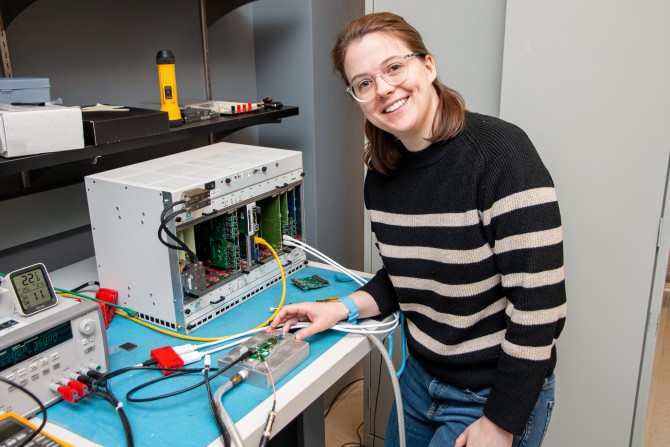
News directly from Cornell's colleges and centers
Cornell Celebrates Breakthrough Prize for LHC Collaborations
Research & Innovation
By Rick Ryan
The international scientific collaborations at CERN’s Large Hadron Collider (LHC) have been awarded the 2024 Breakthrough Prize in Fundamental Physics, honoring their groundbreaking contributions to our understanding of the universe. Cornell scientists, students, and engineers are active members of the CMS collaboration, and are currently leading a major upgrade to the CMS detector that will power the next era of discoveries at the LHC.
The CMS experiment, one of two general-purpose detectors at the LHC, alongside ATLAS, discovered the Higgs boson in 2012.
The Breakthrough Prize recognizes these experiments for their “detailed measurements of Higgs boson properties confirming the symmetry-breaking mechanism of mass generation, the discovery of new strongly interacting particles, the study of rare processes and matter-antimatter asymmetry, and the exploration of nature at the shortest distances and most extreme conditions at CERN’s Large Hadron Collider,” according to the Prize Foundation.
“The scale of the LHC physics program is huge. So many world-leading results have come out of these experiments, and we’re just getting started.” said Jennet Dickinson, assistant professor of physics in the College of Arts and Sciences and researcher at CLASSE. Dickinson’s research focuses on the Higgs boson. She also works on particle tracking detectors, including microchips that use artificial intelligence to compress data.
Cornell is coordinating an $88 million upgrade of the CMS detector—part of a broader effort to prepare for the High-Luminosity LHC (HL-LHC), which will begin operation in 2030. The HL-LHC will produce ten times more data than the current LHC, enabling more precise measurements of the Higgs boson and expanding the search for phenomena such as dark matter.
The upgrade, which involves over 30 U.S. university groups, focuses on enhancing CMS’s ability to track and analyze the overwhelming amount of data expected from the HL-LHC. Cornell is coordinating two major components: the construction of the forward pixel detector, which identifies particles at the edge of the CMS collision point, and the track trigger, a high-speed system that determines which events are worth saving for analysis. Many of the mechanical and cooling components for the detector are also being designed and built at Cornell.
The U.S. contributions to CMS are jointly supported by the National Science Foundation and the Department of Energy, with Cornell leading the NSF-supported portions of the project.
Cornell researchers are also helping develop next-generation software to handle the HL-LHC’s data flood. Through the Institute for Research and Innovation in Software for High Energy Physics (IRIS-HEP), a $25 million NSF-funded initiative, Cornell is contributing to real-time data processing systems that will help scientists sift through billions of collisions to find rare, meaningful events. Cornell students and faculty are also supported by a 3.7M$ NSF grant titled “Particle Physics at the High Energy Frontier: Run-3 to Hl-LHC."
Following consultation with the experiments’ management teams, the Breakthrough Prize Foundation announced that the $3 million prize will be donated to the CERN & Society Foundation, which will use the funds to support doctoral students from member institutions in conducting research at CERN.
“Collisions at the HL-LHC will be messier and more complex than at any other collider,” Dickinson said. “We have to make sure that our new detector and our analysis techniques can cope with the chaos. And a big part of that effort is happening right here at Cornell.”
Media Contact
Get Cornell news delivered right to your inbox.
Subscribe

